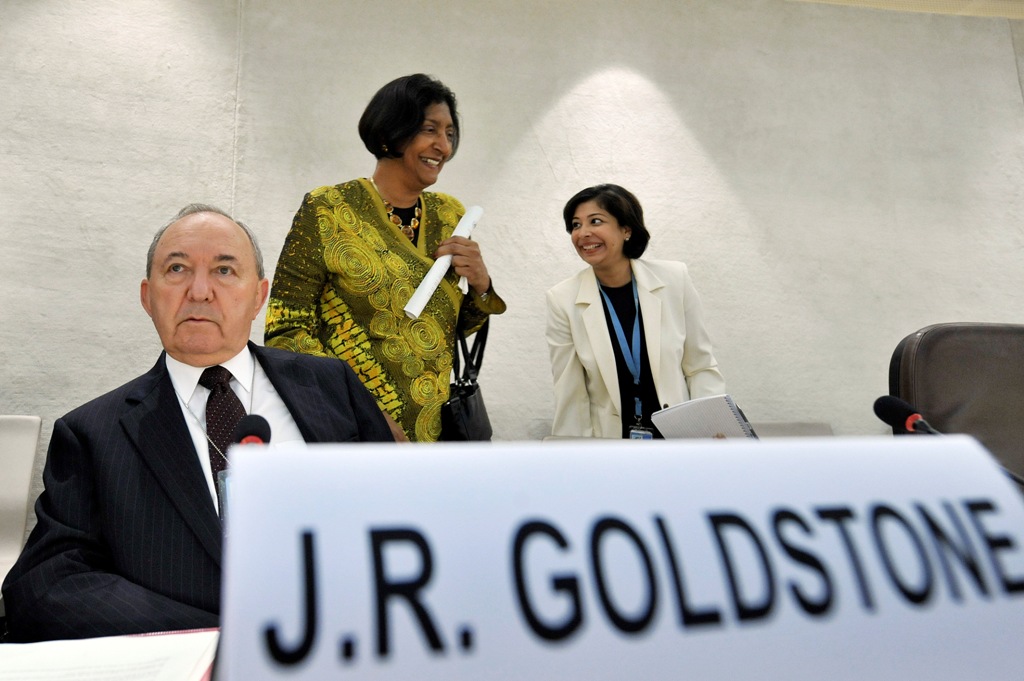Posner says Goldstone report “flawed,” judge defends findings

UN Photo / Jean-Marc Ferre
The U.S. has urged its close ally Israel to conduct credible investigations into allegations of war crimes committed by the IDF in Gaza in December 2008 and January 2009, saying it would help advance the Middle East peace process, Reuters reports. Michael Posner, U.S. Assistant Secretary of State, surprised human rights advocates on 29 September when he said that Goldstone’s report was “deeply flawed,” without elaborating on details. Speaking before the U.N. Human Rights Council in Geneva, Posner said Washington disagreed with the report’s “methodology and many of its recommendations.” He added that the Council paid “grossly disproportionate attention” to Israel, but that the U.S. delegation stood ready to engage in a balanced debate. He encouraged Israel to “utilize domestic [judicial] review and meaningful accountability mechanisms to investigate and follow up on credible allegations.” “If undertaken properly and fairly, these reviews can serve as important confidence-building measures that will support the larger essential objective which is a shared quest for justice and lasting peace,” he said. More here. Goldstone defended his report (AP) that accused both Israel and Palestinian militants of war crimes during the Gaza conflict, rejecting the criticism by Israel that the report was politically motivated. “We believe deeply in the rule of law, humanitarian law, human rights and the principle that in armed conflict civilians should to the greatest extent possible be protected from harm,” he told the U.N. Human Rights Council before the intense day-long debate of the Human Rights Council. Read his full statement here and the subsequent press release on presentation of the report to the Human Rights Council. A transcript of the press conference is also available. Webcasts are also available at the UNHRC archive. Read the full Report of the United Nations Fact Finding Mission on the Gaza Conflict
Executive Summary (Advance 1)
Conclusions and Recommendations (Advance 2)
Law on state secrets
Attorney General Eric Holder Jr. has recently set out new guidelines on invoking the rule on state secrets in the future. A New York Times editorial welcomes this as “a positive step forward, on paper, but [it] did not go nearly far enough.”
One of the ways that the Bush administration tried to avoid accountability for its serious misconduct in the name of fighting terrorism was the misuse of an evidentiary rule called the state secrets privilege. The Obama administration has essentially embraced the Bush approach in existing cases, trying to toss out important lawsuits alleging kidnapping, torture and unlawful wiretapping without any evidence being presented. [...]
[...] Mr. Holder’s much-anticipated reform plan does not include any shift in the Obama administration’s demand for blanket secrecy in pending cases. Nor does it include support for legislation that would mandate thorough court review of state secrets claims made by the executive branch. [...] Hardly a panacea to ending state secrets abuses, the new regulations remain largely susceptible to subjective interpretation and enforcement, the editorial claims. The law’s success would also be contingent upon whether the Justice Department is able – or, rather, willing – to stand its ground, vis-a-vis intelligence agency demands. The editorial urges the Obama administration to support the State Secrets Protection Act sponsored in the Senate by Patrick Leahy, the Judiciary Committee chairman, and in the House by Representative Jerrold Nadler, a Democrat of New York: The need for such safeguards is not theoretical. Even as Mr. Holder tried to reassure Americans with new written rules, the Justice Department was seeking dismissal of a significant lawsuit over the Bush administration’s extraordinary renditions program based on a blanket claim of national security by Gen. Michael Hayden, the former director of the Central Intelligence Agency. More here. Richard Gowan, of the European Council on Foreign Relations, and Franziska Brantner, a German member of the European Parliament, discuss worrying trends at the U.N. for Western positions on human rights. Read more Richard Goldstone, head of the UN fact-finding mission on the Gaza conflict, writes today in The New York Times. Read moreBacksliding on Human Rights
Goldstone on “Justice in Gaza”
